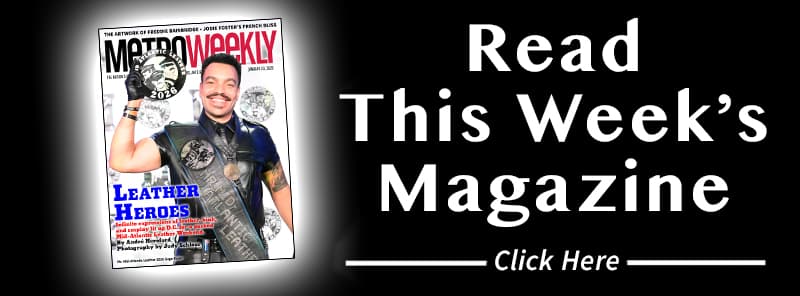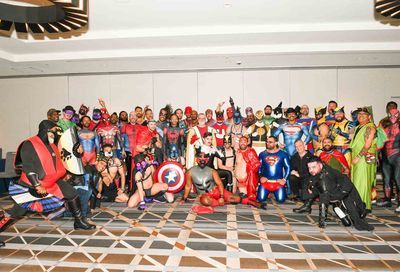Seven Families Sue Iowa Over “Don’t Say Gay” Law
A group of families with LGBTQ children are suing the state of Iowa over a law banning LGBTQ content from schools.

The families of eight LGBTQ youth are suing the state of Iowa over its “Don’t Say Gay” law.
Among other things, the law seeks to eliminate any mention of LGBTQ identity in schools and make it easier to ban books with LGBTQ content.
Teachers, counselors, school psychologists, and staff are required to report students to their parents or guardians if they begin identifying as a gender that does not match their assigned sex at birth, or if they ask to be referred to by gender-affirming names or pronouns.
Unlike Florida’s “Don’t Say Gay” law, Iowa’s does not contain an exemption for children who might be subjected to physical harm or abuse at home if outed as transgender.
Iowa’s law forbids “any program, curriculum, test, survey, questionnaire, promotion, or instruction relating to gender identity of sexual orientation” in grades K-6.
As a result, school districts have taken down “safe space” stickers, removed references to LGBTQ historical figures from library displays, and banned books with LGBTQ themes or characters from libraries and classrooms.
Schools have also cracked down on Gender Sexuality Alliance (GSA) clubs by preventing them from meeting or intimidating teachers and staff from serving as faculty sponsors.
The law also requires public schools serving grades K-12 to remove all books containing “descriptions or visual depictions of a sex act,” with the explicit exception of the Bible.
This has led school districts to purge hundreds of books. School districts, superintendents, or individual teachers who have violated the law will receive a written warning for a first infraction. Subsequent infractions will evoke disciplinary actions, such as termination or loss of teaching licenses.
In the lawsuit, filed in U.S. District Court for the Southern District of Iowa, the lawyers representing the seven families, along with the organization Iowa Safe Schools, allege that the law is a form of content- and viewpoint-based discrimination. They argue that it is in violation of students’ First Amendment right to receive information, infringes on their freedom of speech and expression, and deprives students seeking to join GSAs of their right to freedom of expressive association.
The lawsuit also argues that the law is unconstitutional because it is overly vague by not clearly defining the breadth of the book ban, or how school districts are expected to enforce it.
The lawsuit asks the court to issue a temporary order blocking the implementation of the law while the lawsuit is argued in court. It also asks the court to declare the law unconstitutional and permanently block it.
“[The law] is a clear violation of public school students’ First Amendment right to speak, read, and learn freely,” Thomas Story, an attorney for the ACLU of Iowa, said in a statement. “The First Amendment does not allow our state or our schools to remove books or issue blanket bans on discussion and materials simply because a group of politicians or parents find them offensive.”
“This law erases and silences LGBTQ+ students and their families from school classrooms, books, and history,” Nathan Maxwell, a senior attorney for Lambda Legal, added in his own statement. “It sends the message that LGBTQ+ kids are too shameful to be acknowledged and endangers not only their mental health, but also their physical safety and well-being.”
Puck Carlson, a high school senior in Iowa City and a plaintiff in the case, said that the law’s book ban provisions will have unintended negative consequences, forcing adolescents to seek out banned material in other ways or through alternative channels that may be more harmful.
“When I was in seventh grade, I read Melissa by Alex Gino,” Carlson said in a statement. “It was the first time I had read about a trans kid.
“While that might not seem like a lot, being able to find and identify yourself with things is an important part of being a child…. Removing these books not only makes queer people less visible, but it also stops students from discovering and being true to themselves.”
Another plaintiff, Percy Batista-Pedro, a high school junior from Waterloo, noted that the bill has forced his school’s GSA to shut down and has created a hostile school environment for transgender and gender-nonconforming kids.
“I am scared of being harassed if I wear Pride apparel, or if I talk about my identity in class,” Batista-Pedro said in a statement. “During my freshman year, while I was performing in a play, a student in the crowd threatened to kill me. I believe the student knew me because of a protest I had staged earlier that year at my high school. Now, after SF 496 and the climate it has created to shame and invite violence against transgender people, I would be terrified of organizing another protest.”
The Rev. Brigit Stevens, the mother of Berry, a gender-fluid child, noted in a statement that her child was harassed for wearing a T-shirt with a rainbow on it and for wearing a Pride flag around their shoulders during “culture day” at school.
A group of students tried to grab the flag and hurled insults at Berry, but little was done to address the situation. Stevens notes that some teachers and staff may be reluctant to intervene for fear of being targeted for discipline or termination by the law.
“This law singles out our LGBTQ kids. It makes them unsafe at school. And it sends the message that there is something wrong with them,” Stevens said.
“There is nothing wrong with Berry and kids like them. They are smart and funny, kind and loving. They have a right to be safe at school. This law is immoral and unjust. Berry should be worrying about math tests and show choir rehearsals, not bullying and harassment. Berry should be encouraged at school to be their fullest and most wonderful self. That is what we want and expect for all of our kids.”
Support Metro Weekly’s Journalism
These are challenging times for news organizations. And yet it’s crucial we stay active and provide vital resources and information to both our local readers and the world. So won’t you please take a moment and consider supporting Metro Weekly with a membership? For as little as $5 a month, you can help ensure Metro Weekly magazine and MetroWeekly.com remain free, viable resources as we provide the best, most diverse, culturally-resonant LGBTQ coverage in both the D.C. region and around the world. Memberships come with exclusive perks and discounts, your own personal digital delivery of each week’s magazine (and an archive), access to our Member's Lounge when it launches this fall, and exclusive members-only items like Metro Weekly Membership Mugs and Tote Bags! Check out all our membership levels here and please join us today!



























You must be logged in to post a comment.